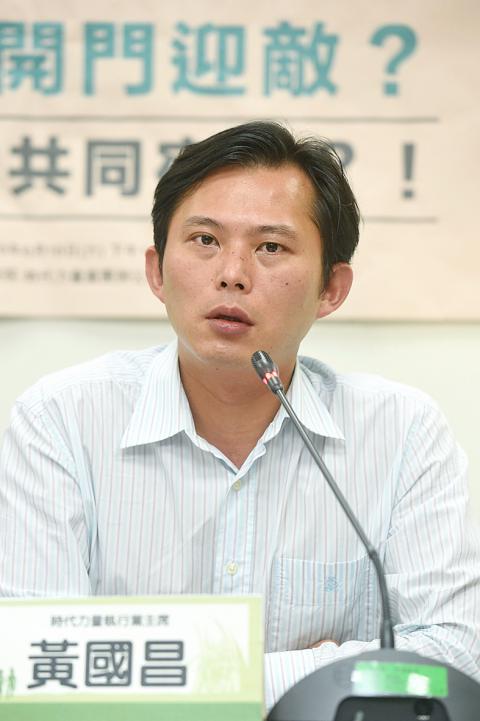Chinese investment in MediaTek Inc (聯發科), a leading handset chipmaker, should be blocked to prevent technology transfer, New Power Party (NPP) legislators, an academic and members of the Economic Democracy Union said yesterday, adding that any exceptions made for the firm would set a dangerous precedent.
“Our semiconductor design industry has a large market in China and it faces a huge amount of pressure to allow direct Chinese investment. Taiwanese government regulations are their strongest defense, because it enables them to tell Chinese firms that no is no and there is nothing they can do,” NPP Executive Chairman Huang Kuo-chang (黃國昌) said.
While most firms in the industry have not publically expressed opposition to the MediaTek deal to avoid Chinese retaliation, many are opposed, because the precedent would lead to further pressure to allow technology transfers by accepting direct investment, Huang said.

Photo: George Tsorng, Taipei Times
“Opening up to Chinese investment is not motivated by a need for capital — our semiconductor industry does not lack for capital. China’s objective is to use direct investment to secure technology transfers,” he said.
“Semiconductor firms should keep in mind the amount of public resources that were invested into nurturing the industry and put national interests before short-term profit,” Huang added.
MediaTek chairman Tsai Ming-kai (蔡明介) has pushed for a conditional relaxation of the ban on Chinese firms making equity investments in local chip designers as a means to gain greater market share in China and the opportunity to participate in the drafting of 5G wireless regulatory standards.
National Sun Yat-sen University sociology professor Tsai Hung-cheng (蔡宏政) questioned whether Chinese investment would guarantee the firm a role in the drafting of the standards, given China’s lack of proprietary technology.
“The only way the Chinese will make rapid progress in the sector is if they have Taiwanese technology — their primary motivation for investment [in MediaTek] is to make a breakthrough,” he said, adding that any concessions would be met with further Chinese demands for board seats and the establishment of research and development centers in China.
“The government must be proactive and prevent companies from acting purely for their individual interests, because China is willing to give the first firm [that pushes for allowing investment] rich incentives to make the breakthrough possible,” Tsai Hung-cheng said.
Economic Democracy Union convener Lai Chung-chiang (賴中強) rejected assertions that technology transfers could be averted as long as Chinese firms are banned from having board seats in Taiwanese corporations.
“Investing firms would wield significant power as major customers and investors, with the full weight of Chinese government capital to back them up. All they have to do to gain access to technology is demand that Chinese and Taiwanese teams collaborate on product innovations,” he said, adding that there is overly broad executive discretion to approve Chinese investment, given the lack of national regulations.
The Economic Democracy Union is a consortium of nongovernmental organizations that played a central role in organizing initial opposition to the cross-strait service trade agreement.

AGING: As of last month, people aged 65 or older accounted for 20.06 percent of the total population and the number of couples who got married fell by 18,685 from 2024 Taiwan has surpassed South Korea as the country least willing to have children, with an annual crude birthrate of 4.62 per 1,000 people, Ministry of the Interior data showed yesterday. The nation was previously ranked the second-lowest country in terms of total fertility rate, or the average number of children a woman has in her lifetime. However, South Korea’s fertility rate began to recover from 2023, with total fertility rate rising from 0.72 and estimated to reach 0.82 to 0.85 by last year, and the crude birthrate projected at 6.7 per 1,000 people. Japan’s crude birthrate was projected to fall below six,

US President Donald Trump in an interview with the New York Times published on Thursday said that “it’s up to” Chinese President Xi Jinping (習近平) what China does on Taiwan, but that he would be “very unhappy” with a change in the “status quo.” “He [Xi] considers it to be a part of China, and that’s up to him what he’s going to be doing, but I’ve expressed to him that I would be very unhappy if he did that, and I don’t think he’ll do that. I hope he doesn’t do that,” Trump said. Trump made the comments in the context

SELF-DEFENSE: Tokyo has accelerated its spending goal and its defense minister said the nation needs to discuss whether it should develop nuclear-powered submarines China is ramping up objections to what it sees as Japan’s desire to acquire nuclear weapons, despite Tokyo’s longstanding renunciation of such arms, deepening another fissure in the two neighbors’ increasingly tense ties. In what appears to be a concerted effort, China’s foreign and defense ministries issued statements on Thursday condemning alleged remilitarism efforts by Tokyo. The remarks came as two of the country’s top think tanks jointly issued a 29-page report framing actions by “right-wing forces” in Japan as posing a “serious threat” to world peace. While that report did not define “right-wing forces,” the Chinese Ministry of Foreign Affairs was

PREPAREDNESS: Given the difficulty of importing ammunition during wartime, the Ministry of National Defense said it would prioritize ‘coproduction’ partnerships A newly formed unit of the Marine Corps tasked with land-based security operations has recently replaced its aging, domestically produced rifles with more advanced, US-made M4A1 rifles, a source said yesterday. The unnamed source familiar with the matter said the First Security Battalion of the Marine Corps’ Air Defense and Base Guard Group has replaced its older T65K2 rifles, which have been in service since the late 1980s, with the newly received M4A1s. The source did not say exactly when the upgrade took place or how many M4A1s were issued to the battalion. The confirmation came after Chinese-language media reported